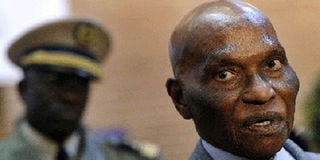Dakar bishop and Wade in bid to end rebellion

Senegalese president Abdoulaye Wade. POTO/ FILE
What you need to know:
- December has been described as the bloodiest month since the secessionist war began in 1982 in southern region
DAKAR, Monday
The hard-talking Bishop of Dakar Theodore Adrien Sarr has blamed both the government and the Casamance rebels for not doing enough to end three-decade armed conflict in the south of the country.
Ostensibly alluding to the government in his New Year eve sermon, he asked: “Why should we fail to denounce the guilt of some people who are trying to enrich themselves from the war at the detriment of the local population?”
He insisted that the armed crisis was dragging on mainly due to “negligence and mischief of some government authorities in managing the conflict”.
“No one can put out a fire by lighting up fire!” he said.
Preaching for the first time in ten years in the centre of the troubled southern Casamance region, the Catholic bishop urged the government to open up to an “unequivocal dialogue” with the rebellion.
And to the leaders of the Movement des Forces Démocratique du Casamance or Mfdc rebels, Bishop Sarr advised them to “cultivate the conviction that the solution to their claims could lie elsewhere than in war.”
Bishop Sarr challenged President Abdoulaye Wade to keep his promise of withdrawing an international legal pursuit against the leaders of the rebellion.
In his New Year speech, President Wade said the government has given up the pursuit of Mssrs Salif Sadio and Ousmane Dabo, the military leaders of Mfdc in exchange for a guarantee to disarmament.
Furthermore, President Wade promised to facilitate the process of social reintegration for the armed elements after the disarmament and demobilization.
Bishop Sarr said he remained optimistic about an imminent end to the armed conflict if the recipe presented by himself and President Wade were followed to the letter.
December 2011 has been described as the bloodiest month since the secessionist war began in 1982 with an estimated 30 government troops killed, five taken hostage according the defence ministry and 20 by the rebel count while dozens of civilians were killed and dozens more seriously injured.




